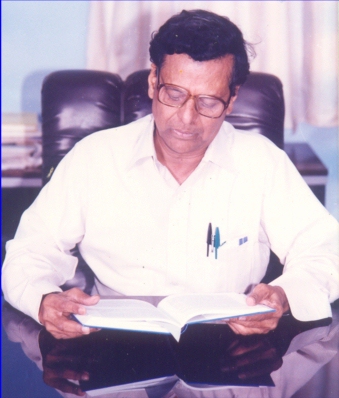|
PROFESSOR S. K.
RANGARAJAN (1932 – 2008) Sarukkai Krishnamachari Rangarajan
(fondly referred to as SKR by his friends, colleagues and students) passed
away on 29th April, 2008.
He was a genius, a man of many talents, unique in that his ability in science
was matched by his fineness as a human being.
SKR was born on September 9,
1932. He obtained his B.A. (Hon) in
mathematics from the Madras Christian College (MCC), in 1953. After graduation, he started off as a film critic,
and also wrote for a Tamil arts magazine “ At that time, the Central
Electrochemical Research Institute (CECRI) was headed by the very
distinguished electrochemist, Prof. K.S.G. Doss. He had just discovered the
phenomenon of faradaic rectification, and was
looking for some one to develop a proper theory for the process. Doss approached SKR, expecting the theory
to be developed in about a year, but the problem was solved in a day! Doss was so impressed that he persuaded
SKR to join the CECRI. He did so in
1960 but left in 1970, after the retirement of Doss. Doss
who had contributed very significantly to electrochemistry, is reputed to
have said “my most significant contribution to electrochemistry was finding
SKR”. SKR spent the next two years as a Homi Bhabha fellow at the National Aeronautical Laboratory
and continued there as a scientist till 1975, when he was
invited by Prof. S. Dhawan, Director of the Indian
Institute of Science, to join the
Department of Inorganic and Physical Chemistry (IPC) as a professor. During
his term at this department, he was a visiting professor at At the IISc,
SKR had a very active group and had several bright students, who continue to
be very active in the field. SKR worked mainly on theoretical problems in
electrochemistry. In addition he also continued to work on mathematics,
biophysical chemistry, theoretical physics and even mechanical
engineering. After retiring from the
IPC department in 1993, he was a senior professor at Matscience
for three years, and after that he was a visitor at the Raman Research
Institute. The IPC department very
much wanted him to spend time in the dept. and persuaded him to visit them
once in a week and he had been visiting this department roughly once in a
week. He was very active until the
very end, and was working on an interesting and important problem, and had
solved it just the day previous to his death. A week before his death, he had
come to the IPC and excitedly told us that he was planning to give a series
of lectures on “Stochastic Problems in Chemical Sciences” and that he would
start in a week’s time. SKR was an outstanding theoretician and
electrochemist. Though the only
degree that he ever had was a bachelor’s degree in mathematics, he was a world
renowned theoretical electrochemist, and was in the editorial boards of
international journals in the field.
While at IISc and elsewhere, he was an
inspiration to a large number of
bright students, even though they were not working with him. To quote one such, He was well recognized by the usual standards - was elected
as FASc, FNA and FTWAS. In addition, he was given Alumni Award
(1993) of the IISc and the lifetime achievement
award of the Chemical Research Society of India (2008), in addition to many
other awards and honors. However, to
those who were privileged to know him closely, his abilities were far more
than what these awards convey. He is survived by his wife,
daughter and four sons. His eldest
son, Sunder Sarukkai works at NIAS, and is well
known in his own right. In SKR’s death, the country has lost an outstanding
scientist. Personally, I have lost my
brilliant, warm hearted, affectionate, kind “Guru”, a sorrow shared by all his
students and admirers. He will live on
in our memory for ever. K. L. Sebastian ( Professor, Department of
Inorganic and Physical Chemistry Indian Institute of Science |
